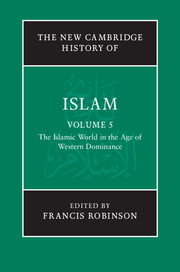Book contents
- Frontmatter
- Introduction
- PART I THE ONSET OF WESTERN DOMINATION C. 1800 TO C. 1919
- PART II INDEPENDENCE AND REVIVAL C. 1919 TO THE PRESENT
- 11 Turkey from the rise of Atatürk
- 12 West Asia from the First World War
- 13 Egypt from 1919
- 14 Sudan from 1919
- 15 North Africa from the First World War
- 16 Saudi Arabia, southern Arabia and the Gulf states from the First World War
- 17 Iran from 1919
- 18 Central Asia and the Caucasus from the First World War
- 19 Afghanistan from 1919
- 20 South Asia from 1919
- 21 South-East Asia from 1910
- 22 Africa south of the Sahara from the First World War
- 23 Islam in China from the First World War
- 24 Islam in the West
- Glossary
- Bibliography
- Index
- References
11 - Turkey from the rise of Atatürk
from PART II - INDEPENDENCE AND REVIVAL C. 1919 TO THE PRESENT
Published online by Cambridge University Press: 28 March 2011
- Frontmatter
- Introduction
- PART I THE ONSET OF WESTERN DOMINATION C. 1800 TO C. 1919
- PART II INDEPENDENCE AND REVIVAL C. 1919 TO THE PRESENT
- 11 Turkey from the rise of Atatürk
- 12 West Asia from the First World War
- 13 Egypt from 1919
- 14 Sudan from 1919
- 15 North Africa from the First World War
- 16 Saudi Arabia, southern Arabia and the Gulf states from the First World War
- 17 Iran from 1919
- 18 Central Asia and the Caucasus from the First World War
- 19 Afghanistan from 1919
- 20 South Asia from 1919
- 21 South-East Asia from 1910
- 22 Africa south of the Sahara from the First World War
- 23 Islam in China from the First World War
- 24 Islam in the West
- Glossary
- Bibliography
- Index
- References
Summary
Introduction
On 17 December 2004, after several days of meetings in Brussels, when the representatives of the current and future members of the European Union (EU) lined up for their customary photograph to mark the conclusion of a successful convention, the group included a representative from Turkey. In those two days the EU had agreed to start negotiations with Turkey that could result in her full membership. It is well known that European public opinion has been strongly opposed to Turkey’s accession to candidate status. Many believe that inclusion of a country whose population is overwhelmingly Muslim and poor will undermine the coherence of the EU.
In Turkey too, however, there are people who find the inclusion of Turkey’s prime minister, Tayyip Erdoǧan, in the EU’s group photograph somewhat unsettling. This relatively small but highly influential group includes some members of the civilian and military elite and intellectuals. Even though Westernisation has been the central ambition of the modern Turkish Republic since its foundation in 1923, and even though Turkey is closer than ever to these ideals today, this elite is unhappy that the country has been brought to this stage by a party and a politician with deep roots in Islamist politics.
- Type
- Chapter
- Information
- The New Cambridge History of Islam , pp. 299 - 335Publisher: Cambridge University PressPrint publication year: 2010

